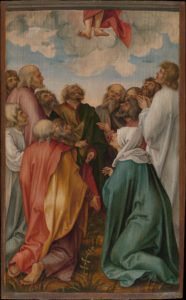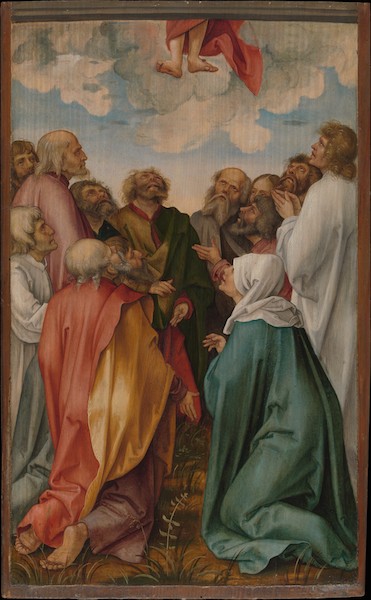a sermon on Acts 1:1-11
preached on May 8, 2016, at the First Presbyterian Church of Whitestone

The Ascension of Christ, Hans Süss von Kulmbach, 1513. Metropolitan Museum of Art.
The moment of Jesus’ ascension is probably unlike most any other in human experience. Artists and writers have tried to depict this moment in various ways over the centuries. The ascension is a very common theme in religious art, including the very interesting image on the cover of our bulletin today that leaves our focus on Jesus’ feet hanging down from the heavens. In more recent years, a commentator has suggested—and rejected—two more modern images: Jesus rising into heaven like a rocket launch or being “beamed up” as in Star Trek (Ronald Cole Turner, “Theological Perspective on Acts 1:1-11,” Feasting on the Word, Year C, Volume 2, p. 498). No matter what image we might use, the ascension is strange and unexpected enough that human words and images just can’t capture the wonder of this strange event.
The strange and unexpected wonder of this day is nothing new—even the disciples had to be confused and uncertain when Jesus ascended into heaven. They had enjoyed the presence of the resurrected Jesus for some forty days after his resurrection, and they went with him to the mount not at all expecting that this journey would be their last with Jesus. Sure, he had repeatedly warned them that he would be leaving them and sending the Holy Spirit to be with them, but their lack of understanding culminated in those uncertain and puzzled looks that we see in the painting on our bulletin cover.
Their act of blankly looking up encapsulated everything that they had experienced in all their following of Jesus. Their many expectations of what Jesus would do and especially how he would do it had been upended at every turn from the very beginning. They had repeatedly been forced to change their understanding of what God was doing and how God would do it in the life, ministry, death, and resurrection of Jesus. And time and time again they had been left dumbfounded by Jesus’ words and actions as they struggled to figure out what it all would mean for their lives and their world.
As they looked up in those moments after Jesus disappeared from their eyes, the disciples’ conversation with Jesus atop the mountain only moments before had to be echoing in their ears. He had given them three clear points for their consideration—perhaps introducing in that moment the form that would dominate Christian proclamation many centuries later!
First, Jesus had told them that they needed to wait in Jerusalem for what would happen next. I suspect that this is not what they had been planning to do. The disciples were not city folks, after all—they had followed Jesus to Jerusalem from the countryside of Galilee, and they couldn’t have been particularly comfortable with the idea that they needed to stay there. To date, the whole Jesus movement had been pretty much confined to the countryside, and this would indicate the beginnings of a major shift ahead. Still, Jesus assured them that the things soon to follow would be worth it:
You will be baptized with the Holy Spirit not many days from now.
As they waited for this upcoming baptism and transformation of their lives, Jesus continued with his second point that destroyed some of their expectations about the things that were ahead. The disciples were anxious and ready for him to “restore the kingdom to Israel” and lead a more complete transformation of their community and nation, but Jesus would have nothing of it. “It is not for you to know the times or periods that the Father has set by his own authority,” he told them. Beyond all this uncertainty in timing, the sort of drastic, dramatic transformation that the disciples seemed to want here—and so many times before, too—was not in the cards for Jesus. He had not come to overthrow the powers of the world through traditional means of waging war or political revolution, for by defeating death itself, he transformed the world by defeating the deeper powers of evil and destruction that separate us from God.
The conversation on the mountaintop between Jesus and the disciples concluded with Jesus’ third point reminding them of the things ahead. They were to “receive power when the Holy Spirit has come upon” them, and they would be given new and greater ability to engage Jesus’ message of freedom and new life. But even more, they would become his “witnesses in Jerusalem, in all Judea and Samaria, and to the ends of the earth.” The disciples would be more than a band of students united by the teachings of their teacher—they would start a movement that would change the course of history all around the world as they told about their experiences with Jesus and invited others to join them in living as he invited them to.
As the disciples stood looking up to heaven, pondering these words and their experiences along the way, they received one final message to direct their way ahead. Two men in white robes suddenly joined them on the mountaintop, reminiscent of the two men in dazzling clothes who had appeared to the women at Jesus’ tomb on the day of resurrection. Just as they had on Easter morning, these messengers spoke amid the uncertainty and confusion of a strange moment, this time inviting them to take a different perspective as they gazed up into the sky.
Why do you stand looking up toward heaven? This Jesus, who has been taken up from you into heaven, will come in the same way as you saw him go into heaven.
In these words, the two men sought to recenter the disciples in their experiences with Jesus, remind them of his promises to them, and focus their attention on the real things that were ahead for their witness to Jesus in the world. It was easy, you see, for the disciples to stare at Jesus’ feet dangling in the sky, to spend all their time looking up, to mourn the departure of their friend and teacher for the last time, rather than to confront the real possibility and challenge of the mission that Jesus had placed before them.
We so easily fall victim to this ourselves, too. It is easy to spend our time looking up, looking ahead to a promise of a different world that we might enjoy for ourselves, and miss Jesus’ call to make God’s new life real in this world, too. It is easy to put our time and energy into wondering where Jesus is in our lives and so forget to bear witness to him in ways that reveal him to others. And it is easy to pause in joy and amazement at the moments of glory that sneak into our lives and miss that these are the very moments that should lead us into words and actions that join in God’s transformation of the world.
As commentator Richard Landers puts it,
Ascensions and moments of divine encounter can dazzle us so that we forget the surrounding world. We glory in the moment, only to find that God has moved on, and so must we. (“Homiletical Perspective on Acts 1:1-11,” Feasting on the Word, Year C, Volume 2, p. 501)
The ascension of Jesus calls the disciples and us to do more than spend our days looking up. The ascension invites us to explore together how Jesus’ reign with God in power, sealed for us by this vision of his ascension into heaven, gives us hope for the transformation of our world. The ascension gives us assurance in the promise of the Holy Spirit that we will not be left to offer our witness to the wonder of Christ alone. And the ascension shows that God empowers us for our own lives of faith and work, for just as God has moved on from the glory of this moment, so we too must move forward and join in God’s work to reveal that glory again and again in the church and the world.
So as we celebrate the ascension of Jesus this day, as we remember how the disciples spent so much time looking up, as we are tempted to draw our eyes heavenward and miss the call of God around us, may God give us hope that there is something more than what we have seen before, confidence that are not left alone to bear witness to the wonder and glory of Jesus in the days ahead, and power to be faithful witnesses of all the things that God has done, is doing, and will do in this world and the next until the one who reigns in glory now is revealed in all fullness and hope as all things are made new in Jesus Christ our risen and ascended Lord.
Lord, come quickly! Alleluia! Amen.
